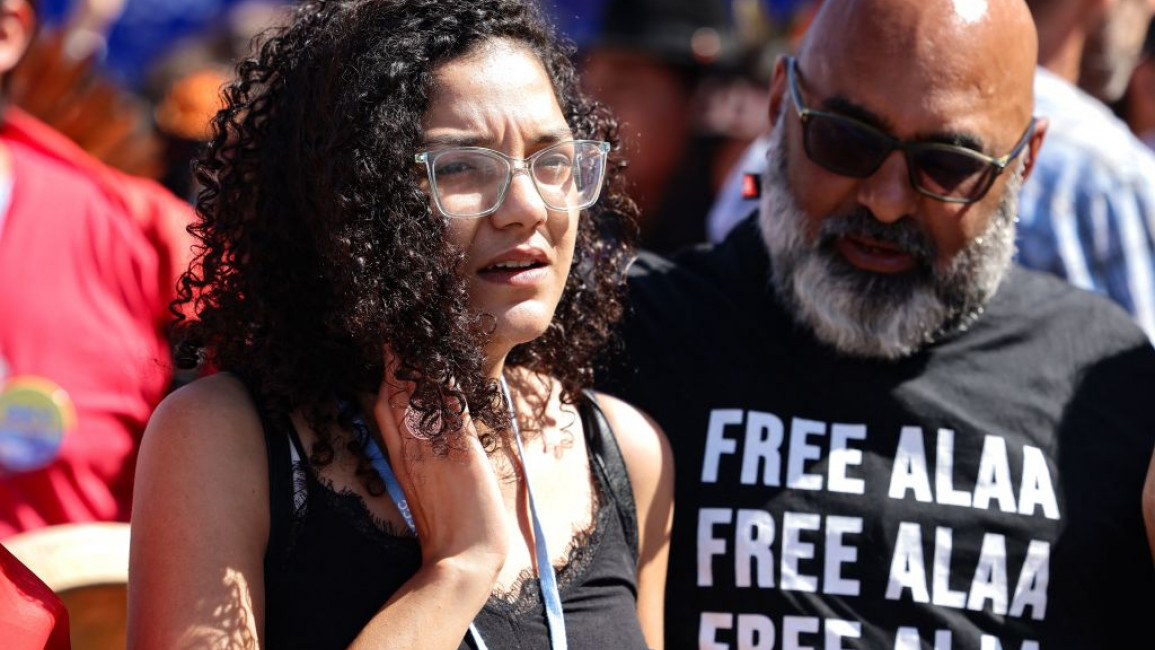Alaa Abdel Fattah's sister to address Human Rights Council as alarm sounded over prison suicide attempts
The sister of imprisoned Egyptian activist Alaa Abdel Fattah will appear before the UN Human Rights Council in Geneva on Wednesday to campaign for her brother’s release, as a human rights group warned that inmates at Egypt's recently constructed Badr prison were suffering "horrific abuses", with many attempting suicide.
Sanaa Seif, whose brother has spent much of the last ten years in jail, said that world leaders had failed to honour promises to secure Alaa's release.
"The pledges made during COP27 by world leaders are - I think - what kept Alaa from returning to hunger strike, after he nearly died during the conference. He thought, as we all did, that it would mean something when leaders of Germany, Britain, France, the USA and the UN all publicly say they want his release," Sanaa Seif said in a statement.
"My brother had pushed himself to the absolute limit, then pulled back at the last moment because he allowed himself to hope."
Abdel-Fattah is a dual British-Egyptian national who gained prominence during the 2011 Egyptian revolution which toppled long-time dictator Hosni Mubarak.
He was sentenced in December 2021 to five years in prison for "spreading false news" by sharing another user's Facebook post about police brutality.
Abdel-Fattah went on a hunger strike for nearly six months last year to protest his detention, and escalated his protest by refusing to drink water during the UN COP27 climate summit which was held in Egypt in November 2022.
Campaigns were held for him during the summit in Sharm el-Sheikh, which drew ire and frustration from the Egyptian government.
The race against time to save Alaa Abdel Fattah: Q&A with Sanaa Seif 👇 #FreeAlaa #COP27 https://t.co/jXvAITGP3Q
— The New Arab (@The_NewArab) November 7, 2022
World leaders – including British Prime Minister Rishi Sunak - pledged that they would do more to press for his release.
However, no progress has been made since and Abdel Fattah remains locked up.
"But now months have passed and what are we hoping for? All we hear is silence. The leaders came, they went home, and their promises seem to be forgotten," Seif said in her statement.
"We need the UN Human Rights Council to take action. Governments who have said they are committed to Alaa’s freedom must lead in this effort and stop turning a blind eye to brutal repression."
Seif has decried governments’ silence on her brother’s case and their failure to even speak of the issue at the UN.
She will also take part in a UN event on Thursday that will address Egypt’s worsening human rights situation and economic crisis.
Dozens attempt suicide at 'model' prison amid abuse allegations
Alaa Abdel Fattah is one of thousands of Egyptian political activists and opponents who languish in prisons, where torture, abuse, and neglect of basic needs such as medical care is common.
A human rights group has sounded alarm over the increase in suicide rates at one prison.
Democracy for the Arab World Now (DAWN) said that the UN Human Rights Council should investigate leaked reports of serious human rights abuses at the Badr 3 Prison.
"The leaked messages from Badr prison detailing horrific abuses highlights both the growing desperation inmates feel and the utter failure of El-Sisi's alleged prison reforms" said Jon Hoffman, Research Director at DAWN.
Prisoners were committing suicide by cutting their arteries, hanging themselves and overdosing, the Al-Shehab Centre for Human Rightsaid.
It has tweeted pictures of letters it says are being leaked from the prison.
#عاجل
— الشهاب لحقوق الإنسان (@ElshehabNgo) March 11, 2023
رسالة وصلتنا من اخت معتقل #مركز_الشهاب_لحقوق_الإنسان pic.twitter.com/f2fAKyDsaQ
// الرسالة السادسة //
— الشهاب لحقوق الإنسان (@ElshehabNgo) March 12, 2023
من #سجن_بدر3#مركز_الشهاب_لحقوق_الإنسان pic.twitter.com/1OUEwX9YTB
Prisoners at Badr 3 have been protesting for weeks now over dire conditions and demanding authorities provide them with their basic needs, threatening to kill themselves if their demands are not met.
Authorities have allegedly banned family visits and even contact with their lawyers.
During a ten day period ending on 1 March, at least 55 detainees have attempted suicide, according to messages leaked from inside the prison. Dozens have announced their open-ended hunger strike.
Upon its opening, the Egyptian government hailed the "Badr Correctional and Rehabilitation Center" as a "model for reform." It took journalists on a tour of the prison, a move critics saw as part of a government bid to mollify Western criticism of its rights record and to draw in more aid and foreign investment.
Badr prison, which holds some of Egypt’s most prominent prisoners - including leaders of the outlawed Muslim Brotherhood and other political activists - denies inmates healthcare and subjects them to punitive treatment including isolation, relatives of detainees and rights groups say.



![Widespread famine is imminent in Gaza [Getty Images]](/sites/default/files/styles/image_330x185/public/2024-03/GettyImages-2015647000.jpg?h=199d8c1f&itok=mJWWP_Td)